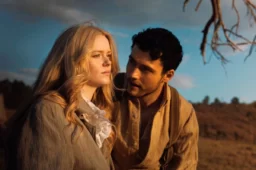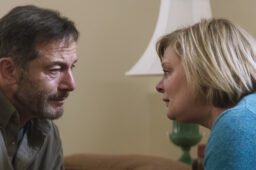
REVIEW: C’mon, C’mon
- November 08, 2021
- by
- Ivan Moore
There is a scary thought nestled in the midst of Jesus’s ministry. Matthew 18 (NIV) says, “Truly I tell you, unless you change and become like little children, you will never enter the kingdom of heaven.” Never enter the kingdom of heaven? Those are pretty dire consequences at stake here, right? Afterall, life has a way of pummeling out of us the elements of a childlike worldview – innocence, curiosity, humble dependence. How is your childlikeness doing? Is it thriving, surviving, or totally disappeared by now? This is a question worth asking, and a new movie from writer/director Mike Mills might just help you find some answers.
C’mon C’mon stars our most recent Joker, Joaquin Phoenix, as Johnny who serves as a radio journalist on a quest to capture a voice of hope in our younger generations. When we meet him, he is travelling across the country interviewing school children about how they view the world and, more specifically, what they expect from the future. He gets all kind of answers, but they all seem to point to the wide-eyed optimism of youth. Even in the face of serious problems that cause their parents and caregivers hopelessness and stress (especially during the pandemic when the film was shot), these young people have a sense that they will be ok. That there is hope for the world, their communities, and their fellow humans. While he is on this journey to interview these young strangers, Johnny find himself caring for his young nephew, Jesse, and it challenges him in ways he likely wasn’t expecting.
The strange waters of parenthood are quite the common setting for fish-out-or-water movies. From the explicitly comical takes like The Rock’s The Game Plan or Vin Diesel’s The Pacifier to more dramatic fare like Mills’ newest effort, filmmakers love watching adults, who are usually deeply set in their ways, have their comfort torn to shreds by the chaos of children. Usually, as is the case with our Fast & Furious boys, they come to the obvious conclusion that they were perhaps living very selfishly. Mills pushes the conversation further. What has Johnny lost on his way to adulthood? As adults we often forget that we can still be formed by our experiences. We get so good at organizing past and incoming events and emotions like a well categorized email inbox. As things happen, we know which cognitive or emotional buckets to drop them in. Sometimes during that process, though, we forget to answer the emails. We’ve made a lot of our overarching decisions about what things mean and how the world works that we forget to be malleable to what could shape us.
The good thing about this compartmentalization, is that our reactions to things can be more controlled or subdued. Jesse, on the other hand, has very extreme emotions for most of the film. He doesn’t have the inbox organized yet so he is feeling everything all the time. He’s not just malleable, he’s vulnerable to the world around him. Being young is information overload, a drink from a fire hydrant. Witnessing someone in the early process of being formed reminds us that we are still capable of that ourselves. Children have a way of making us vulnerable again. Johnny is all of a sudden susceptible to new fears, like losing Jesse to the busy New York streets, and new thoughts, like maybe he hasn’t been fair to his sister in recent years. Jesse offers Johnny the opportunity to reengage with his childlikeness. Johnny also learns he has more to offer Jesse than a cool uncle.
For reasons that do become clear, Jesse prefers not to engage with the questions Johnny has been asking the other children particularly those about the future. Jesse’s life has been a little chaotic. He has been loved and cared for deeply by his mother, but he has also seen what it looks like for his mother to sacrificially love his troubled father. Jesse, even in his youth, is no stranger to the world and is at risk of growing up too fast. Johnny gets a chance to show Jesse a sense of unconventional safety and consistency. Even if Jesse’s peers in the film swear that things will be ok, Johnny gets to personify that to him. He gets to create environments where Jesse can ask questions, have fun, and make mistakes. This is a very Christ-like setting filled with grace and security. It’s an environment his mother provides, but now Johnny can offer it to him in a way that lets him know his mother isn’t the only source of love and safety in his life.
As they travel together, Johnny helps Jesse maintain his childlikeness in ways Johnny may not totally appreciate as he sometimes feels like a failure and Jesse helps Johnny bring his childlikeness back from the brink of adulthood in a way that a 1,000 interviews with strangers never could. Mills has tapped into something deep and real here stemming from his experience with his own young nephew. What would be different in the world if some of our mental and emotional compartments were torn down and we allowed ourselves to continue to be formed? What would be different if we allowed ourselves to be more vulnerable? Trust in systems and each other is at an all-time low. Many of us have our defenses high and thick. It’s going to be a challenge as our communities rebuild post-pandemic, but there is hope in the next generation. As Jesus said, “whoever takes the lowly position of this child is the greatest in the kingdom of heaven. And whoever welcomes one such child in my name welcomes me.”
C’mon C’mon has already screened at some film festivals but will see a wider release starting November 19th, 2021.






